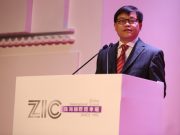(Singapore 12 May 2023) Singapore has no plan to follow the US and the UK in terms of governments’ healthcare spending, Singapore’s Health Minister Ong Ye Kung has said.
He also said Singapore needs to make sure healthcare spending as a proportion of GDP does not increase too much.
“In the coming years, our challenge is not to spend more, but to ensure we do not go the way of many OECD countries, with the healthcare fiscal burden spiralling and escalating out of control,” he said on Wednesday in parliament.
The Organization for Economic Co-operation and Development (OECD) is a unique forum where the governments of 38 democracies — including the US, the UK, Germany, and Japan — with market-based economies collaborate to develop policy standards to promote sustainable economic growth.
The Health Minister said it is “widely known” that spending more on healthcare does not necessarily lead to better health outcomes.
 The US and the UK spend 17% and 10% of their gross domestic products on healthcare respectively, compared with 4% in Singapore. However, the US and UK still face a high incidence of chronic illness, high obesity rates and lower expected lifespans, he said.
The US and the UK spend 17% and 10% of their gross domestic products on healthcare respectively, compared with 4% in Singapore. However, the US and UK still face a high incidence of chronic illness, high obesity rates and lower expected lifespans, he said.
“We have delivered good health outcomes given what we are spending,” he said.
Ong was responding to points brought up by Non-Constituency MP Leong Mun Wai (PSP) during a two-day debate on a motion on supporting healthcare, which was tabled by Nominated MPs Dr Tan Yia Swam, Mr Abdul Samad and Dr Shahira Abdullah.
Mr Leong said the government has not contributed enough to cover healthcare expenditure. He cited World Health Organisation statistics on Singapore’s government covering 43% of healthcare costs in 2019, compared with 33% in 2011.
However, the figure is still much lower than the average of 75% for Organisation for Economic Cooperation and Development (OECD) countries.
“Singaporeans are experiencing first-world healthcare costs but receiving much less first-world financial support from the government,” Mr Leong said on Tuesday.
In response, Ong said Singapore has been able to keep healthcare affordable for middle- to lower-income groups.
He said around seven in 10 Singaporeans in subsidised wards do not pay any out-of-pocket expenses, eight in 10 pay less than S$100 and nine in 10 pay less than S$500.
“When Mr Leong asked (the) government to spend more to lower out-of-pocket expenses further, he really meant to channel resources to unsubsidised patients, that is, those staying in A-class wards or private hospitals… This is where the big bucks and big expenditure are and it will push our healthcare expenditure and spending to the levels of OECD countries,” Ong said.
He also said the NCMP failed to mention that government expenditure ultimately has to be raised from the people through taxes. “Mr Leong had not made any mention of where PSP will get funding from.”
In fact, the Health Ministry has the second-largest budget after the Defence Ministry. Nominal government health expenditure tripled in the decade after 2010 and is expected to triple again in the following decade, One said.
“This is driven by an ageing population, who is also getting sicker,” he added.





































